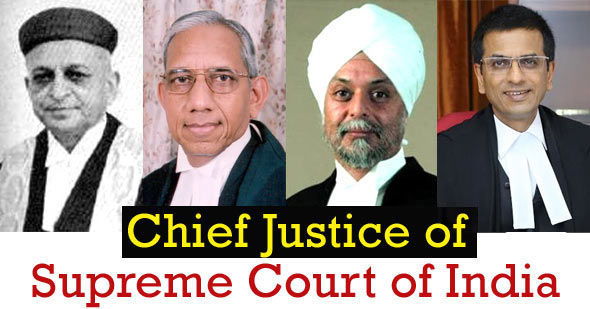Justice Chandrachud, born on November 11, 1959, was elevated to the top court on May 13, 2016. He was a judge of the Bombay High Court from March 29, 2000 until his appointment as the Chief Justice of the Allahabad High Court on October 31, 2013.
Full list of Chief Justices of Supreme Court in India–
| No. |
Chief Justices
|
Period of office
|
| 1. | H. J. Kania | August, 1947 – November, 1951 |
| 2. | M. Patanjali Sastri | November, 1951 – January, 1954 |
| 3. | Mehar Chand Mahajan | January, 1954 – December, 1954 |
| 4. | B.K. Mukherjea | December, 1954 – January, 1956 |
| 5. | S.R. Das | February, 1956 – September, 1959 |
| 6. | B. P. Sinha | October, 1959 – January, 1964 |
| 7. | P.B. Gajendragadkar | February, 1964 – March, 1966 |
| 8. | A.K. Sarkar | March, 1966 – June, 1966 |
| 9. | K. Subba Rao | June, 1966 – April, 1967 |
| 10. | K.N. Wanchoo | April, 1967 – February, 1968 |
| 11. | M. Hidayatullah | February, 1968 – December, 1970 |
| 12. | J.C. Shah | December, 1970 – January, 1971 |
| 13. | S.M. Sikri | January, 1971 – April, 1973 |
| 14. | A.N. Ray | April, 1973 – January, 1977 |
| 15. | M.H. Beg | January, 1977 – February, 1978 |
| 16. | Y.V. Chandrachud | February, 1978 – July, 1985 |
| 17. | P. N. Bhagwati | July, 1985 – December, 1986 |
| 18. | R.S. Pathak | December, 1986 – June, 1989 |
| 19. | E.S. Venkataramiah | June, 1989 – December, 1989 |
| 20. | Sabyasachi Mukharjee | December, 1989 – September, 1990 |
| 21. | Ranganath Mishra | September, 1990 – November, 1991 |
| 22. | K.N. Singh | November, 1991 – December, 1991 |
| 23. | M.H. Kania | December, 1991 – November, 1992 |
| 24. | L.M. Sharma | November, 1992 – February, 1993 |
| 25. | M.N. Venkatachaliah | February, 1993 – October, 1994 |
| 26. | Aziz Mushabbar Ahmadi | October, 1994 – March, 1997 |
| 27. | J.S. Verma | March, 1997 – January, 1998 |
| 28. | M.M. Punchhi | January, 1998 – October, 1998 |
| 29. | A.S. Anand | October, 1998 – November, 2001 |
| 30. | S. P. Bharucha | November, 2001 – May, 2002 |
| 31. | Bhupinder Nath Kripal | May, 2002 – November, 2002 |
| 32. | Mr. G.B Pattanaik | November, 2002 – December, 2002 |
| 33. | Mr. V.N. Khare | December, 2002 – May, 2004 |
| 34. | Mr. S. Rajendra Babu | May, 2004 – June, 2004 |
| 35. | R. C. Lahoti | June, 2004 – 31 October, 2005 |
| 36. | Y. K. Sabharwal | 2 November, 2005 – 14 January, 2007 |
| 37. | K.G. Balakrishnan | 15 January, 2007 – 11 May, 2010 |
| 38. | S. H. Kapadia | 12 May, 2010 – 28 September, 2012 |
| 39. | Altamas Kabir | 29 September, 2012 – 18 July, 2013 |
| 40. | P. Sathasivam | 19 July, 2013 – 26 April, 2014 |
| 41. | Rajendra Mal Lodha | 27 April, 2014 – 27 September, 2014 |
| 42. | H. L. Dattu | 28 September, 2014 – 2 December, 2015 |
| 43. | T. S. Thakur | 3 December, 2015 – 3 January, 2017 |
| 44. | Jagdish Singh Khehar | 4 January, 2017 – 27 August 2017 |
| 45. | Dipak Misra | 28 August 2017 – 1 October 2018 |
| 46. | Ranjan Gogoi | 2 October 2018 – 17 November 2019 |
| 47. | Sharad Arvind Bobde | 18 November 2019 – 23 April, 2021 |
| 48. | Nuthalapati Venkata Ramana | 24 April, 2021 – 26 August 2022 |
| 49. | UU Lalit | 27 August 2022 – 8 November 2022 |
| 50. | DY Chandrachud | 9 November 2022 – Incumbent |
Appointment: The Chief Justice of India is appointed by the President. Other Judges of the Supreme Court are appointed by the president in consultation with the chief justice. He may also consult other judges of the Supreme Court and High Courts while appointing a judge to the Supreme Court.
Tenure: Judges of the Supreme Court can hold office up to the age of 65 years.
Qualification: Any citizen of India who has been a judge of a High Court for 5 years, or in the opinion of the President, is an eminent jurist, or who has been a practicing advocate in a High Court for a period of 10 years can be nominated as a judge of the Supreme Court [Article 124(3)].








